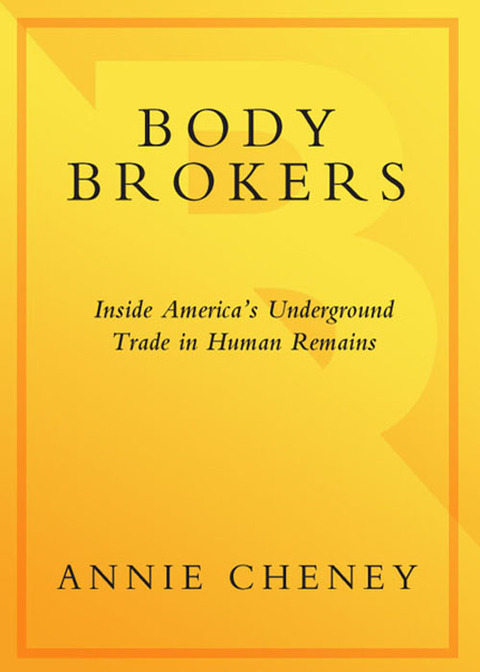
Body Brokers: Inside America's Underground Trade in Human Remains PDF
Preview Body Brokers: Inside America's Underground Trade in Human Remains
“You are a little soul carrying around a corpse.” —Epictetus
“Wherever the corpse is, there the vultures will follow.” —Matthew 24:28
Body Brokers is an audacious, disturbing, and compellingly written investigative exposé of the lucrative business of procuring, buying, and selling human cadavers and body parts.
Every year human corpses meant for anatomy classes, burial, or cremation find their way into the hands of a shadowy group of entrepreneurs who profit by buying and selling human remains. While the government has controls on organs and tissue meant for transplantation, these “body brokers” capitalize on the myriad other uses for dead bodies that receive no federal oversight whatsoever: commercial seminars to introduce new medical gadgetry; medical research studies and training courses; and U.S. Army land-mine explosion tests. A single corpse used for these purposes can generate up to $10,000.
As journalist Annie Cheney found while reporting on this subject over the course of three years, when there’s that much money to be made with no federal regulation, there are all sorts of shady (and fascinating) characters who are willing to employ questionable practices—from deception and outright theft—to acquire, market and distribute human bodies and parts. In Michigan and New York she discovers funeral directors who buy corpses from medical schools and supply the parts to surgical equipment companies and associations of surgeons. In California, she meets a crematorium owner who sold the body parts of people he was supposed to cremate, generating hundreds of thousands of dollars in profits. In Florida, she attends a medical conference in a luxury hotel, where fresh torsos are delivered in Igloo coolers and displayed on gurneys in a room normally used for banquets. “That torso that you’re living in right now is just flesh and bones to me. To me, it’s a product,” says the New Jersey-based broker presiding over the torsos. Tracing the origins of body brokering from the “resurrectionists” of the nineteenth century to the entrepreneurs of today, Cheney chronicles how demand for cadavers has long driven unscrupulous funeral home, crematorium and medical school personnel to treat human bodies as commodities.
Gripping, often chilling, and sure to cause a reexamination of the American way of death, Body Brokers is both a captivating work of first-person reportage and a surprising inside look at a little-known aspect of the “death care” world.
From BooklistStarred Review Here's one with the potential to keep folks up nights, wondering whether the urn on the mantel contains 100-percent Uncle Fred or a blend. Before journalist Cheney began an assignment for My Generation magazine, she had never suspected there might be diverse career opportunities for cadavers, that whatever one wants to be when one grows up, options continue to exist postmortem. But consider the ever-popular organ donor program. And then there's the option of donating one's body to a medical school for the betterment of mankind through science. Once that latter choice is made, Cheney learned, alternatives multiply, and a corpse can follow one of several roads. On a lower thoroughfare, big bucks are waiting for the cold-blooded entrepreneur ready to carve human bodies up like chickens and parcel them out to the highest bidder for such uses as military bomb test dummies, lifelike operative subjects for medical seminars, and resource troves for the machine-tooling of bones into orthopedic apparatus. Even if one never willingly donates one's body, there are enough unscrupulous morticians and morgue workers who will surreptitiously carve out an ulna or a femur and replace it with a PVC pipe, then sell the goods on the not-so-open open market. This is a chilling expose of the grisly industry of body trading. Donna Chavez
Copyright © American Library Association. All rights reserved
“Horrifying! Annie Cheney’s account is meticulously reported and compellingly written. She uses details to anchor scenes visually and then pushes the reader to visualize the entrepreneurial manipulation of corpses—their dismemberment, sale and use—as both gruesome and matter-of-fact. She backs up her narrative with research into history, literature and crime.”
—Society of Professional Journalists 2005 Featuring Reporting Award, judges’ citation
